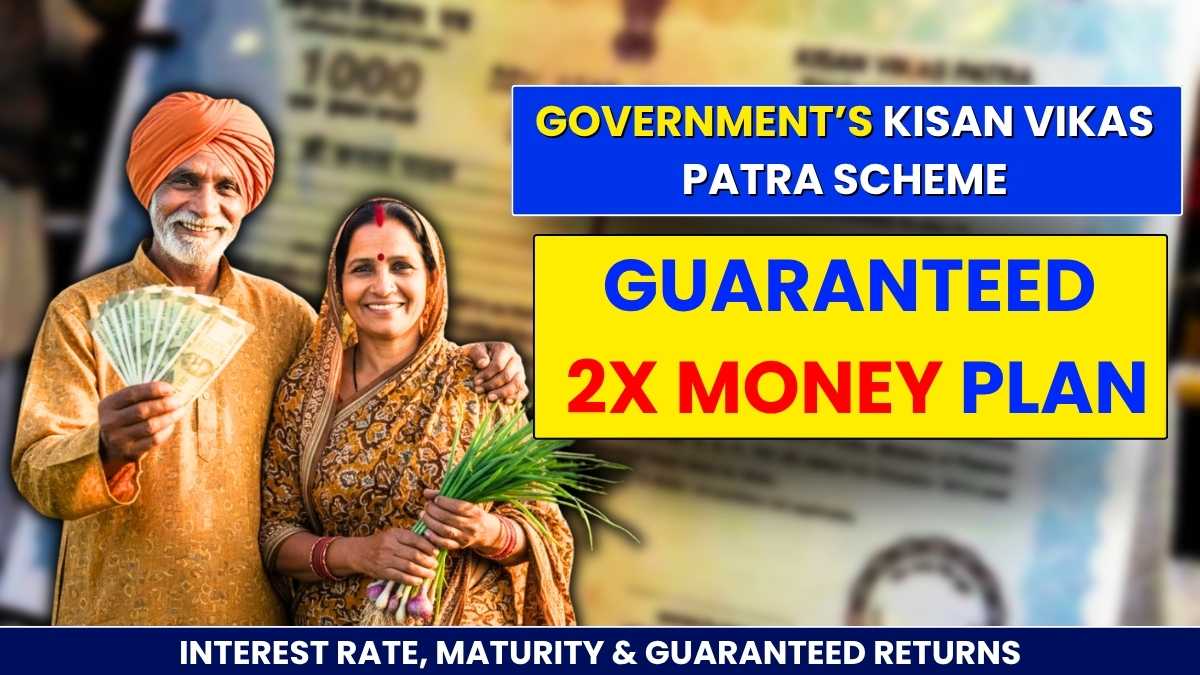Kisan Vikas Patra (KVP) has always been a favourite for people who prefer secure and predictable growth. It’s a pure no-risk savings option backed fully by the Government of India, making it perfect for long-term planners who want guaranteed returns without worrying about market swings.
If doubling your money in a fixed period sounds appealing, this scheme deserves your attention.
Introduction to Kisan Vikas Patra
KVP is a small savings certificate available through post offices and authorised banks across India.
It’s simple, disciplined, and built for people who want steady wealth creation over time.
Key highlights include:
- Government guarantee on the full amount
- Minimum entry as low as ₹1,000
- No limit on maximum investment
- Certificate-based investment with fixed maturity
- Suitable for individuals of all ages, including minors (through guardians)
How the Doubling Feature Works
The biggest attraction of KVP is its guarantee: your investment doubles after a fixed maturity period.
This doubling timeline is linked to the interest rate announced by the government.
Here’s how it works:
- Your deposit earns compound interest quietly in the background
- You don’t receive annual payouts; the amount grows internally
- At maturity, the total automatically becomes twice your original deposit
So, if you invest ₹50,000 and the maturity period is set at 10 years, you get ₹1,00,000 at the end no calculations or market tracking needed.
Investment Rules, Limits, and Account Types
To make the scheme available for everyone, the rules are kept straightforward.
| Feature | Details |
|---|---|
| Minimum deposit | ₹1,000 |
| Maximum limit | No limit |
| Available at | All post offices, selected banks |
| Types of accounts | Single, joint, and minor accounts |
| Eligibility | Indian residents only |
This simplicity is one of the main reasons the scheme is widely trusted.
Mistakes That Reduce the Benefit of KVP
Many people invest in KVP without understanding some key points. Avoiding these mistakes helps you get the maximum value.
Not checking the current maturity period
The doubling period changes when interest rates change. Always confirm the latest duration before buying.
Redeeming too early
Even though premature closure is allowed after 2.5 years, withdrawing early cuts into your growth. Full benefit comes only at maturity.
Forgetting about taxation
Interest earned on KVP is taxable. There is no Section 80C benefit for the deposit.
This is important when planning long-term goals.
Losing the certificate
If you choose a physical certificate and misplace it, you need extra paperwork to replace it. Opting for e-certificates helps avoid this problem.
Tips to Use KVP Effectively
- Use KVP for goals that don’t need regular liquidity such as a future safety fund or children’s financial milestones.
- Split the investment into multiple certificates for staggered maturity and better cash flow later.
- Combine KVP with a monthly income or pension scheme for balanced planning.
- Keep the certificate details stored digitally to prevent loss.
Updates You Should Know for 2025
KVP’s interest rate is reviewed quarterly, which means the doubling timeline can shift slightly depending on economic conditions.
In recent updates, the government has streamlined digital tracking, making it easier to view and manage certificates at post offices.
These improvements make KVP more convenient than before especially for investors comfortable with online processes.
Conclusion
Kisan Vikas Patra remains one of the safest long-term savings avenues in India. Its straightforward design, guaranteed doubling feature, and government backing make it ideal for anyone who wants reliable growth without risk. If your financial style leans towards security and certainty, KVP can be a powerful addition to your savings portfolio.
FAQs
How much time does KVP take to double my money?
The period changes with interest rate revisions but generally stays around 9–10 years.
Can I withdraw my KVP early?
Yes, but only after 2.5 years. Closing it early reduces the advantage, so holding till maturity is ideal.
Is the interest on KVP taxable?
Yes, the interest earned is taxable according to your income slab.



